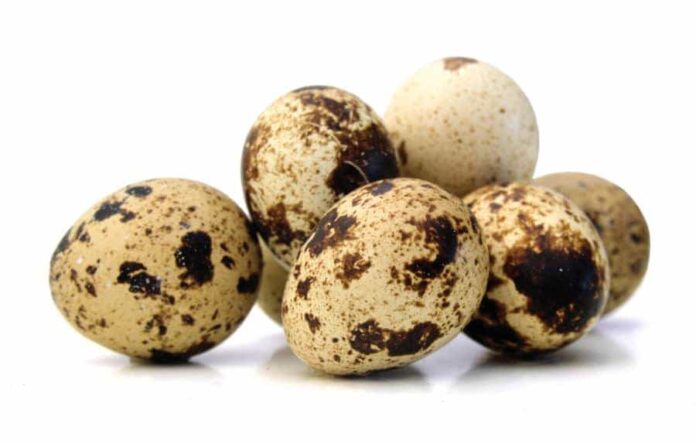Last Updated on July 2, 2021 by Fumipets
Although chicken egg is the most consumed type of egg in the world, the taste and nutritional benefits of quail eggs stand out.
Apart from the fact that quail egg is adorable, there are quite a few other reasons to consider adding it to one’s nutritional diet.
Quails are easy to keep and cater for as they require less space and are less demanding. They can produce close to 300 eggs per year.
Some breeds will begin laying eggs at 6 weeks of age compare to the 24 weeks it takes for chickens and duck.
Appearance
The quail egg is significantly smaller in size compared to a duck egg, and for certain breeds like the Button quail, they literally are the size of a jelly bean.
The quail egg is shaped like a chicken egg—just smaller. They are usually cream-colored with a variety of speckles and spots splashed over the shell.
Taste
A lot of people erroneously assume that quail eggs taste differently than chicken or duck eggs when in reality, they all have very similar tastes (depending upon how they were raised).
Like the eggs of a Guinea fowl, quail eggs have a high yolk-to-egg white ratio. This means the eggs come out much thicker, and creamier when used for cooking or baking.
Also, quail eggs are lighter in flavour than duck eggs and creamier in composition than chicken eggs.
Nutritional Benefits
Quail eggs contain a good amount of protein, especially for their size. They are also higher in vitamins
Eating quail eggs help the nervous, digestive, and respiratory systems due to their high vitamin content. And since quail eggs are considered to be antioxidants, they may also assist in the elimination of harmful toxins.
However, due to the high yolk-to-egg white ratio, they are higher in cholesterol— but this is considered to be good cholesterol and not as harmful as often believed.
Raising Quails
To raise quails, a special quail cage is required with a built-in tray with a slant that helps new eggs gently roll down and out of the cage. The tray stops the tiny eggs from getting dirty and trampled by quail, thereby making the collection process a lot easier.
If you keep your quail in a ground pen, or free-range, you may have a harder time tracking down your lovely little eggs.
In terms of feeding, quails get most of their diet out of seeds and grains, with the addition of other proteins like bugs and grubs.
Commercial Viability
Quail eggs are very expensive as they are considered to be quite exotic and rare.
An average crate of quail eggs sells for as much as $100, making it a very lucrative business to venture into.
Conclusion
On both nutritional and economic fronts, quail eggs are better alternatives to the widely popular chicken egg.
A single quail egg provides a significant chunk of your daily vitamin B12, selenium, riboflavin, and choline needs, along with some iron — all in a serving that contains only 14 calories.
So make the switch, try out quail eggs, and thank us later!


















